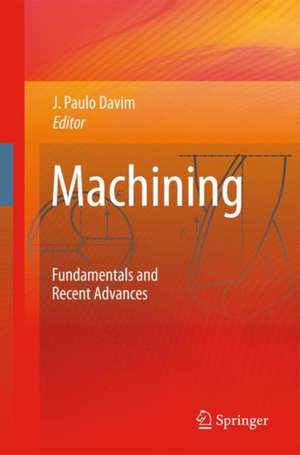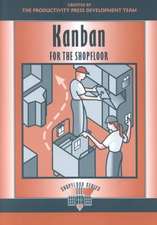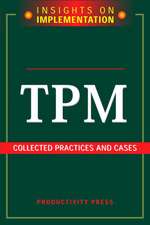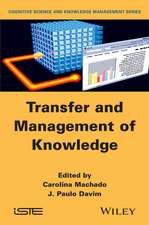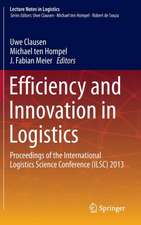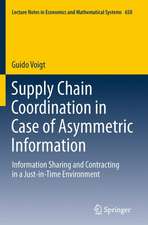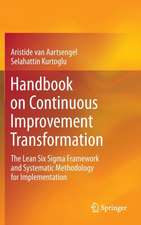Machining: Fundamentals and Recent Advances
Editat de J. Paulo Davimen Limba Engleză Hardback – 23 sep 2008
| Toate formatele și edițiile | Preț | Express |
|---|---|---|
| Paperback (1) | 948.29 lei 6-8 săpt. | |
| SPRINGER LONDON – 12 oct 2010 | 948.29 lei 6-8 săpt. | |
| Hardback (2) | 956.03 lei 6-8 săpt. | |
| Nova Science Publishers Inc – 30 iun 2013 | 1082.96 lei 3-5 săpt. | |
| SPRINGER LONDON – 23 sep 2008 | 956.03 lei 6-8 săpt. |
Preț: 956.03 lei
Preț vechi: 1165.88 lei
-18% Nou
Puncte Express: 1434
Preț estimativ în valută:
182.96€ • 190.31$ • 151.04£
182.96€ • 190.31$ • 151.04£
Carte tipărită la comandă
Livrare economică 14-28 aprilie
Preluare comenzi: 021 569.72.76
Specificații
ISBN-13: 9781848002128
ISBN-10: 1848002122
Pagini: 376
Ilustrații: XIV, 362 p.
Dimensiuni: 155 x 235 x 25 mm
Greutate: 0.75 kg
Ediția:2008
Editura: SPRINGER LONDON
Colecția Springer
Locul publicării:London, United Kingdom
ISBN-10: 1848002122
Pagini: 376
Ilustrații: XIV, 362 p.
Dimensiuni: 155 x 235 x 25 mm
Greutate: 0.75 kg
Ediția:2008
Editura: SPRINGER LONDON
Colecția Springer
Locul publicării:London, United Kingdom
Public țintă
ResearchDescriere
Machining is one of the most important manufacturing processes. Parts manufactured by other processes often require further operations before the product is ready for application. “Machining: Fundamentals and Recent Advances” is divided into two parts. Part I explains the fundamentals of machining, with special emphasis on three important aspects: mechanics of machining, tools, and work-piece integrity. Part II is dedicated to recent advances in machining, including: machining of hard materials, machining of metal matrix composites, drilling polymeric matrix composites, ecological machining (minimal quantity of lubrication), high-speed machining (sculptured surfaces), grinding technology and new grinding wheels, micro- and nano-machining, non-traditional machining processes, and intelligent machining (computational methods and optimization). Advanced students, researchers and professionals interested or involved in modern manufacturing engineering will find the book a useful reference.
Cuprins
Metal Cutting Mechanics, Finite Element ModellingTools (Geometry and Material) and Tool WearWorkpiece Surface IntegrityMachining of Hard MaterialsMachining of Particulate-reinforced Metal Matrix CompositesDrilling Polymeric Matrix CompositesEcological Machining: Near Dry MachiningSculptured Surface MachiningGrinding Technology and New Grinding WheelsMicro and NanomachiningAdvanced (Non-traditional) Machining ProcessesIntelligent Machining: Computational Methods and Optimization
Recenzii
Supplementary processes for material removal... such as electric discharge machining, electrochemical machining, ultrasonic machining, laser beam machining, and nanomachining have been in service for several decades. However, despite the extensive use of these processes, several questions remain unanswered. This book represents a fresh attempt to provide the long-overdue answers to some of these research questions. Its 12 chapters present the contributions of 24 of the best-qualified minds of eight countries. The first three chapters cover the basics of machining, with the remainder of the book focusing on newer techniques. Anyone with a research interest in the field of material removal will find this a valuable resource and a worthy addition to their professional and personal libraries... Recommended.
Choice (July 2009) (Reviewer: K. Srinagesh, University of Massachusetts Dartmouth)
Choice (July 2009) (Reviewer: K. Srinagesh, University of Massachusetts Dartmouth)
Notă biografică
J. Paulo Davim received his PhD degree in Mechanical Engineering from the University of Porto in 1997 and the Aggregation from the University of Coimbra in 2005. Between 1986 and 1996, he was a lecturer at the University of Porto. Currently, he is an Aggregate Professor at the Department of Mechanical Engineering of the University of Aveiro and the Head of MACTRIB - Machining and Tribology Research Group. He has more 24 years of teaching and research experience in manufacturing, materials and mechanical engineering. He is the Editor in Chief of four international journals, Guest Editor, Editorial Board Member, Reviewer, and Scientific Advisor for many international journals and conferences. In addition, he has also published more than 250 articles in ISI journals (150 with h-index 14) and conferences.
Textul de pe ultima copertă
Machining is one of the most important manufacturing processes. Parts manufactured by others processes often require further operations before the product is ready for application. Machining is the broad term used to describe the removal of material from a work-piece. Machining processes can be applied to work metallic and non-metallic materials such as polymers, wood, ceramics and composites.
Machining: Fundamentals and Recent Advances is divided into two parts. The first part explains the fundamentals of machining, with special emphasis on three important aspects: mechanics of machining, tools, and work-piece integrity. The second part is dedicated to recent advances in machining, including: machining of hard materials, machining of metal matrix composites, drilling polymeric matrix composites, ecological machining (using the minimal quantity of lubrication), high-speed machining (sculptured surfaces), grinding technology and new grinding wheels, micro- and nano-machining, non-traditional machining processes, and intelligent machining (computational methods and optimization).
Professional engineers, researchers and advanced students interested or involved in modern manufacturing engineering will find Machining: Fundamentals and Recent Advances an invaluable reference.
Machining: Fundamentals and Recent Advances is divided into two parts. The first part explains the fundamentals of machining, with special emphasis on three important aspects: mechanics of machining, tools, and work-piece integrity. The second part is dedicated to recent advances in machining, including: machining of hard materials, machining of metal matrix composites, drilling polymeric matrix composites, ecological machining (using the minimal quantity of lubrication), high-speed machining (sculptured surfaces), grinding technology and new grinding wheels, micro- and nano-machining, non-traditional machining processes, and intelligent machining (computational methods and optimization).
Professional engineers, researchers and advanced students interested or involved in modern manufacturing engineering will find Machining: Fundamentals and Recent Advances an invaluable reference.
Caracteristici
Describes the fundamentals and recent advances in machining
Includes supplementary material: sn.pub/extras
Includes supplementary material: sn.pub/extras
